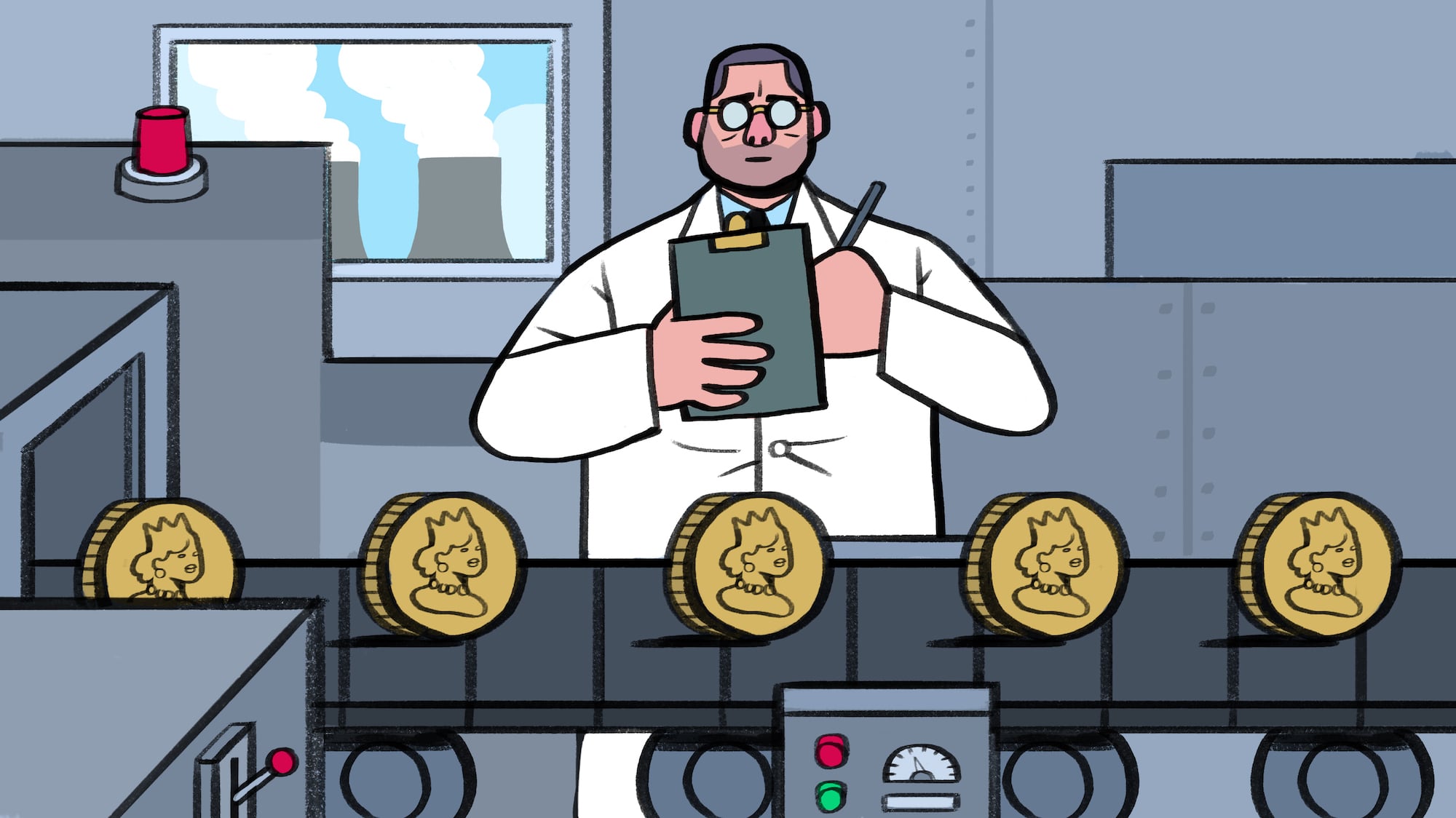This article originally appeared on VICE UK.
Like you and every other person in the world, I am no good at New Year puritanism. Two months in, I’m still often drunk and just as unfamiliar with kettlebell squats. That’s also true of this year; but toward the end of 2018, I decided to actually stick to another resolution. Thanks to my more sensible friends living within their means for the first time in our lives, my light financial neurosis recently morphed into full-blown economic anxiety.
So, I decided to start saving and thought I’d take the most extreme route to fiscal responsibility to force me into doing it properly.
Founded in America in the 1990s, the “FIRE” movement stands for “Financial Independence, Retire Early.” You’ll recognize its main principles in that breed of 23-year-old who’s managed to buy a two-bedroom apartment and they never have any fun. Adherents try to save 50 percent or more of their earnings each month, with the aim of hoarding enough cash to be able to invest it, quit their day jobs, and live off interest and dividends. Many don’t fully retire once they reach this point, using their investment to free themselves from office jobs so they can focus on doing stuff they actually enjoy.
My salary is just under the London average of £34,000 [$44,711]. Taking half my monthly wage for saving, along with rent, bills, and monthly subscriptions like Netflix and Spotify, I’m left with £377 [$495] for the month—a budget of around £12 [$16] a day to cover food, travel, and any other expenses.
My first week’s budget is almost blown out by the post-midnight beers I buy in the blurry hours between New Year’s Eve and New Year’s Day. To balance it out, I spend the rest of the week either at work or at home, not spending much, and not really doing much, either. Time stretches out when you have nothing to do. I spend it the same way I did when I was a student—drinking tea and telling myself I’ll start reading a book after I’ve finished the next game of Fifa.
One aspect of the FIRE movement that appealed to me was its anti-consumerism. A number of the blogs I read argue that if only we bought less and stopped caving into immediate desires for things, we could save more and abandon the daily grind. Some combine the FIRE movement with environmentalism, arguing that if you buy less stuff you can save money and the planet at the same time. The lifestyle is often painted as a mixture of stoicism and financial savvy; I envisage myself as a modern-day Henry David Thoreau-type, living deliberately in the wilds of Zone 2, frugally saving half my paycheck and subsisting off of beans and pita bread until I’ve amassed a small fortune that will see me into early retirement.
“If you agree with the fundamental idea that spending doesn’t bring lasting happiness, then in some ways the other stuff comes more easily,” says Barney Whiter, who runs FIRE blog The Escape Artist.
Although he has an anti-consumerist mindset, Whiter says his frugality was born from childhood experience. His parents bought the biggest house they could afford using the biggest mortgage they could afford, but when a recession hit in the early-1980s they had to drastically cut their spending to make ends meet. How quickly their comfortable life became precarious stayed with Whiter, and he has lived frugally throughout his adult life. Now, at 48, he has been financially independent—meaning he never has to work again—for five years.
Chatting over the phone, I tell him my situation: I’m 28 with no mortgage, nowhere near enough savings for a deposit, and student debt larger than the money I make in a year. “When I started out, I felt like you felt,” he reassures me. “It feels like being at the bottom of Mount Everest looking up at the top, but the trick is to not be overwhelmed and think, Every step I take takes me closer.”
I settle into a new routine during my working days: Getting the bus to and from work (£3) [$4]—sometimes running home to save £1.50 [$1.97]—and eating a Tesco meal deal for lunch (£3) [$4]. I know I should be preparing my own lunches to save an extra bit of cash, but the effort required to save an extra dollar a day doesn’t quite cut it for me. I also split a £20 [$26] to £30 [$39] weekly food shop of basic meals with my girlfriend. My weekday routine means I save around half my daily budget for other stuff—not particularly inspiring, but a solid base from which to build my miserly empire.

Illustration by Dan Evans
Thing is, it doesn’t take long for the romantic version of frugality I’d imagined for myself to dissipate. As I spend my lunch break stolidly working my way through a seventh straight chicken sandwich, I’m reminded of an article I saw about Tory MP Dominic Raab eating the same Pret baguette for lunch every working day of his life. Back when I read it, I marveled at the banality and weird dedication of such pitifully small-time behavior. Now, I was its embodiment.
As well as my diet, frugality also starts affecting my relationships. Getting midweek drinks with friends are off—and even though that’s easier at the start of the year because so many people do dry January—it does make me realize how many of my friends I only really see in the confines of a pub. Going from one or two meals out a week to none doesn’t earn me much credit with my girlfriend, who has already noticed spending more to compensate for my scrimping.
At first, it was easy to fill our weekends by doing free stuff, though a few weeks in they also start to drag. There are only so many free art exhibitions you can wander around before it gets boring. We spend one Saturday getting drunk by downloading some pub and bar apps that give you a free pint just for signing up, while the Dusk app also gives you a free drink a day, but we found the bars it was available in were a bit shitty. Saving money was satisfying, but at the same time, viewing life through the narrow lens of cost/benefit analysis sucked the joy out of it. Far from helping my financial anxiety, it was only making it worse.
“I would stop doing things because I tracked every penny that I spent,” says Huw Davies, who runs the Financially Free by 40 blog. “I took it too far and took value from my life.” Davies admits he was too extreme with his frugality at first—he was so focused on saving up enough to quit his boring sales job that he would do anything to make it happen faster. Eventually, he struck a balance between saving and still enjoying life. For him, frugality boils down to spending on consumables versus spending on experiences. “If I can have an amazing weekend away that I’ll look back on fondly, then I’d much prefer to waste money that way,” he tells me.
I saved £1,000 [$1,315] in my first month of trying FIRE, which is a bit over half my monthly salary. I noticed how much pointless shit I buy during a normal month and how much I could save by not buying so much of it: clothes, food, and things for the house were all easy to cut back on. While it felt good to have so much money left over, saving such a high percentage of my income also felt like an unsustainable grind. Whiter says that’s inevitable on my current salary; the more you earn, of course, the less of a squeeze it is to save a bigger proportion of your money.
Some recent articles on FIRE have been ridiculed—fairly, in my opinion, because their subjects earn six figures, or have received large inheritances. The truth is, FIRE is built on the assumption that you will save and invest more as you progress up the career ladder; given the current state of the journalism industry, I doubt I’ll be earning substantially more any time soon.
If saving half of your mediocre salary seems a bit extreme to you, as it did to me, you might be wondering if there is a middle ground between extreme frugality and carefree spending. Both bloggers I spoke to agree that FIRE isn’t a binary choice—saving 50 percent of your salary each month isn’t the only way to achieve a comfortable future—but you don’t need another article on “money hacks” and the benefits of meal prep to know that you should probably be saving a bit more than you already do. “It’s not useless if you don’t have enough money never to work again,” says Whiter. “Every extra dollar you have gives you more freedom and more choices.”
With global warming triggering the collapse of entire ecosystems, and the constant barrage of other anxiety-inducing news, now does not seem a particularly prescient time to hinge your future on the continuing ability of the global economy to offer returns on your savings at its historic average—and even if it does, some people take issue with the maths behind FIRE.
Writing for Bloomberg, Jared Dillian argues that “the biggest issue with the FIRE movement is that it’s the ultimate bull market phenomenon. FIRE seems to work because the stock market has gone straight up.” He says that even if this continues, using the figures that underpin many of the FIRE movement’s assumptions, “it’s not going to be any fun living on a shoestring budget and watching your nest egg decline in value by 30 percent to 50 percent.” Others still have pointed to ever increasing life expectancy as a problem with FIRE; it’s hard to know whether you have saved enough to retire at 40 if you might live for another half a century.
Beyond the issues with the maths behind FIRE, to me it just doesn’t seem worth it to offset the present in such a drastic way, to reduce life to a series of dispassionate financial decisions, for a shot at something that might never come. “If I just drop dead of a heart attack in six months time, that would be a bummer because I’ve deferred my spending for the future,” says Whiter. “What if I never get to experience that?”
Sign up for our newsletter to get the best of VICE delivered to your inbox daily.
Follow Hayden Vernon on Twitter.
Click here to see the full story






